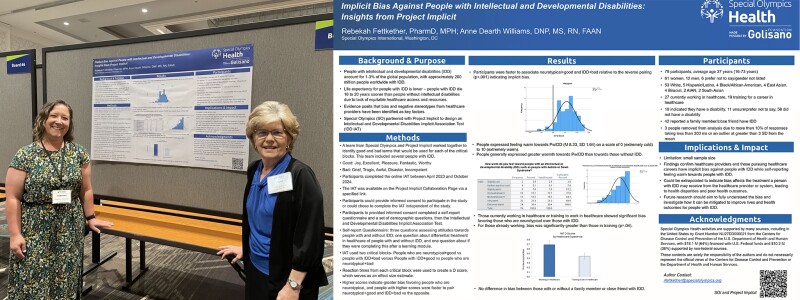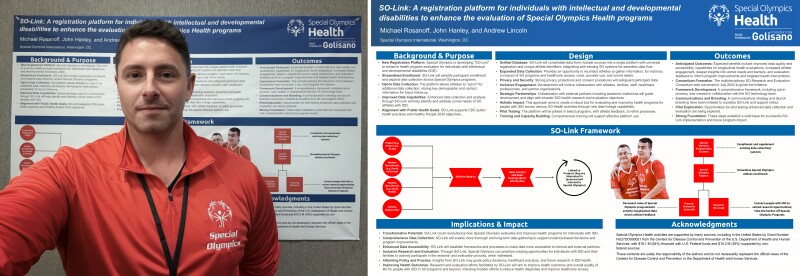Members of the Special Olympics International Health and Unified Champion Schools (UCS) teams attended and presented at the American Association on Intellectual and Developmental Disabilities (AAIDD) Conference from 23 – 25 June 2025. As the oldest and largest interdisciplinary membership organization of professionals concerned about intellectual and developmental disabilities (IDD), AAIDD presented a rich platform for Special Olympics to share work and connect with leaders in the disability field on research, evaluation, and health programming1. This year’s conference explored how mentorship is essential to personal and professional growth, especially in supporting individuals with IDD throughout their lives.
Special Olympics presented two oral presentations and five posters on different areas of work happening across the Health team. Additionally, evaluation partners at University of Minnesota Institute on Community Integration and the Center for Social Development and Education (CSDE) at UMass Boston participated in a symposium on UCS evaluation activities, and the National School Climate Center presented on work examining the relationship between school climate and social inclusion of students with disabilities.

Presentations covered topics ranging from the incorporation of Special Olympics athletes as Standardized Patients in Clinical Simulation laboratories, to the evaluation of a mobile application designed to empower families through the Special Olympics Young Athletes program. Additional subjects included assessing health behaviors in youth with intellectual and developmental disabilities (IDD), navigating the complexities of longitudinal health program evaluation, developing a registration platform to enhance Special Olympics Health program assessments, and examining implicit bias against individuals with IDD.
The symposium on Unified Champion Schools covered topics such as the inclusion of Special Olympics athletes in Clinical Simulation laboratories, evaluation of a family-empowering mobile app, assessment of youth health behaviors, longitudinal health program evaluation, development of a registration platform for program assessment, and the study of implicit bias toward individuals with IDD.
Presentations
Anne Williams, Vice President of Health Services and Education, led a presentation titled, Mentoring across the professional spectrum: Special Olympics inclusive health interprofessional education model. This session highlighted how Special Olympics developed the interprofessional health educational framework, a system which now serves as the foundation for all of Special Olympics’ health education programming. This programming is leveraged to prepare students entering the clinical field to competently work with patients with IDD.
Through her presentation, Anne explained the four levels of the interprofessional health education framework, while also highlighting the Inclusive Health Fundamentals (IHF) modules, which are a series of evidence-based learning activities designed for healthcare students and professionals to introduce the principles of providing high-quality, inclusive care to people with IDD. To date, over 13,000 participants have completed the IHF modules in clinical training programs at over 130 schools and universities across the world. As Anne shared, interprofessional health education is not only effective but also highly valued by learners. Results revealed that learners were both more confident communicating with patients with IDD and had a stronger intent to work with people with IDD after completing the training. Additionally, 98% of the learners reported that they would recommend the training to others.
Rebekah Fettkether, Director of Clinical Education and Training presented an issue brief titled, Incorporation of Special Olympics Athletes into Clinical Simulation as Standardized Patients. Rebekah shared four examples of Special Olympics Programs who have trained Health Messengers as Standardized Patients over the past 18 months. The cases walked through the ways in which clinical professionals, students, and Health Messengers alike trained at each Program, participating in both remote and in-person simulation activities. In the time since this initiative began, faculty, students, and Health Messengers have spoken highly of the experience, leading many universities to expand their simulation activities with Special Olympics athletes moving forward.
Posters

Rebekah also presented: Implicit Bias Against People with Intellectual and Developmental Disabilities: Insights from Project Implicit. This poster highlighted the development of a new Implicit Bias Test focused on people with IDD. This new instrument was developed and piloted in partnership with Project Implicit and showcased initial results from this tool. The results revealed that people of all backgrounds and professions have implicit bias against people with IDD, and healthcare providers and students training to be healthcare providers showed significant bias against people with IDD. Additionally, even among individuals who expressed ‘warm feelings’ toward people with IDD, implicit bias was still present. This new implicit bias test is recommended to be used as an adjunct teaching tool in academic settings to help clinical students recognize their implicit bias to prevent explicit bias, diagnostic overshadowing, and other exclusionary behaviors when delivering healthcare to people with IDD.

Special Olympics athletes were also instrumental in leading presentations as Kimberly Schickley, a global Health Messenger from Special Olympics Pennsylvania, and Cortney Pfeaster, Special Olympics Colorado Evaluation Coordinator, presented Navigating Complexity in Longitudinal Evaluation of Health Programs: The Evolution of Special Olympics Project ALL STAR. Project ALL STAR is a longitudinal health evaluation that tracks how participation in Special Olympics programs impacts the physical, mental, and social-emotional health and well-being of athletes with IDD over time. Kimberly shared her experiences on the Project ALL STAR Athlete Advisory Board with conference attendees and detailed how these experiences have shaped project ALL STAR’s development and implementation. Cortney provided insights on the development of the project and the implementation of the project in Colorado, one of six Programs currently participating in Project ALL STAR.

Ashlyn Smith, Director of Research and Evaluation presented, Empowering Families: Evaluating the usability and feasibility of the Special Olympics Young Athletes Mobile Application. Through this presentation, Ashlyn introduced the Special Olympics Young Athletes App and demonstrated how the app aligns with Young Athletes activities to deliver personalized activities for children at home, fostering parent-child engagement and skill acquisition. The presentation showcased focus group data from 21 parents, caregivers, educators, and coaches across four Special Olympics Programs (Ohio, Kenya, Zimbabwe, and Namibia). Focus group data indicated that the app was important for supporting skill development and engagement within the family unit as well as providing accessible activities to support structured play at home. While the focus group findings were largely positive, they also highlighted areas for future improvement and innovation. These findings were leveraged to make the app even more accessible and user-friendly.

Andy Lincoln, Vice President of Research and Evaluation, presented: Evaluating Health Behaviors in Youth with Intellectual and Developmental Disabilities: Insights from the Special Olympics Youth Lifestyle Survey. This presentation highlighted the creation and evaluation of the Special Olympics Youth Lifestyle Survey, a tool used to assess the health behaviors and barriers faced by youth athletes with IDD. The survey builds upon existing lifestyle surveys to ensure they can be used for younger athletes with IDD. It includes questions on physical activity, nutrition, water intake, and screen time, as well as perceived fitness and enjoyment.
The survey identified actionable insights to improve fitness programming for youth athletes with IDD in a way that is accessible and inclusive. With feedback from athletes, making these surveys more accessible will allow youth athletes to participate more independently, enhancing data accuracy and informing program design. This can lead to better insights on how Special Olympics can create effective, targeted interventions to promote long-term healthy habits among younger athletes.

Michael Rosanoff, Director of Health Services Evaluation, presented: SO-Link: A Registration Platform for Individuals with Intellectual and Developmental Disabilities to Enhance the Evaluation of Special Olympics Health Programs. The poster introduced SO-Link, a new enrollment tool designed to better involve individuals with IDD in inclusive health research and program evaluation. SO-Link aims to lower the barriers for participation in research and evaluation by registering interested athletes in research and evaluation projects aimed at improving the lives of people with IDD. The inclusive research processes that are core to SO-Link will enable better data collection and analysis and in turn, will positively impact the health and well-being of individuals with IDD.
Symposium
Evaluating Special Olympics Unified School Social Activities
Beyond health, AAIDD also included a symposium containing three presentations on evaluations of Special Olympics Unified Champion Schools programming. The first two presentations were led by Brian Abery, Matthew Roberts, and Emily Unholz-Bowden from the Institute on Community Integration at the University of Minnesota. These presentations described Phase 1 of the longitudinal evaluation of UCS, which aims to examine the long-term impact of participation for students with and without intellectual disabilities (ID) during and after high school. Focus groups and surveys were conducted with students with and without ID, educators, and parents to better understand the implementation and impact of UCS. The first round of data collection indicated higher social-emotional learning (SEL) skills and feelings of belonging for youth who participate in UCS compared to those who do not. The last presentation, led by Jeffrey Ramdass at UMass Boston’s Center for Social Development and Education, described a qualitative study conducted as part of the UCS annual evaluation. This presentation demonstrated how the intentionally inclusive spaces provided through UCS are safe and affirming spaces for youth with and without ID, which contributes to their positive identity development.
1. About AAIDD
